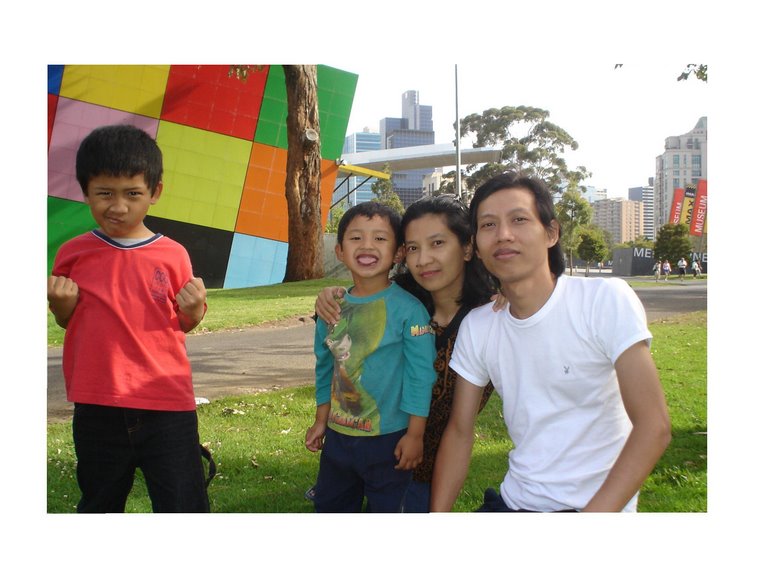I was very happy to recieve both Elkana's and Farhan's school reports from their teachers at the Moreland Primary School. They are excellent. For three years I have appreciated they way school reports are presented. Its mostly qualitative reports with particularly details on five aspects, personal qualities and work habits, integrated studies, LOTE (Language Other Than English), Visual arts, and Library. All aspects are written thoroughly with rating codes B for Beginning, D for Developing, C for Consolidating, E for Established, and N for Not Covered, and with explanation standard level according to the Victorian Curriculum and Standard Framework (CSF). Each one of these aspects explains what student has learned and the student's achievement. The last two pages are general achievement presented in both semi quantitative and qualitative ones. The general achievement presents a rating (A, B, C, D, E) and comparison of students achievement (child's achievement 12 month ago, child's achievement this year, child's progress since last year, and the expected level of achievement) in in five learning areas: English, Personal qualities and work habits, Mathematics, Information and Communications Technology, and Health and Physical Education. The most part I like is the end of the report namely what my child has achieved, what areas to improve in the future learning, what the school will do to support my child, and what parents can do at home to help my child's progress.
After reading thoroughly Elka's and Farhan's reports I remember how poor my school reports were. One semester report was presented only in one page where all of subjects were rated by numbers from one to nine. How can students were judged only by these numbers coming mostly from formal exams which were mostly corrupted? Akhlaq which was regarded as the most important things for students to behave was reported in number from five to nine; five meant you were anak nakal (bad and naughty child) and nine meant you were anak baik sekali. Its so poor. Morality is socially and culturally very important according to Indonesians. However, there is no creative and academic ways to describe anak baik. I did not remember how I learned the akhlaq subject at public schools. There was not any particular subject to learn. My teacher said that the report is taken from a daily observation of akhlaq of the student. I learned the akhlaq subject from madrasah ibtidaiya (islamic primary schools), that I went in the afternoon, and then madrasah tsanawiyah and aliyah (Islamic secondary schools). I have to memorize hadith (prophets traditions) regarding good behaviour which was very abstract. Well, Indonesian culture highly appreciates akhlaq mostly in slogan and symbolic matters related to religious do's and dont's.
Indeed there is no akhlaq subject at Victorian public schools. However, interestingly they have details and thorough explanations on what is regarded as anak baik and akhlaq. It is written in the whole first page of school reports entitles Personal Qualities and Work Habit. The school explains the importance of this area as follows "at Moreland Primary School we aim to provide all children with the foundations for success which will provide them with social, emotional and behavioural well-being in school, work and in the future". The general achievement is divided into four, Confidence (having an "I can do it" attitude), Getting Along (working well with my class mates), Organisation (setting goals and managing times), and Persistence (trying had and not giving up), each of these has few items. In the Getting Along for example students are reported in few items: (1) works cooperatively in a group, (2) Is tolerant and sensitive to other people's feeling, (3) Is polite and well mannered, (4) works without interrupting others, (5) follows school and classroom rulers, and (6) demonstrates responsible and acceptable behaviour. They are all valued as S (starting to do this), U (usually does this), A (always does this) and L (leads and helps other students). In addition, the teacher explains the achivement of personal qualities and work habit in few sentences. Here I quoted Farhan's ones:
"Farhan is a quiet and serious student who applies himself to learning with great concentration. He is always polite and considerate towards others. Farhan is a capable students who is developing progressively well. He is more organized and has started to use his time well. He is slowly gaining confidence and learning express his ideas and sharing them with his peers. Farhan always demonstrates responsible and acceptable behavious. He is always polite and well mannered. He has demonstrated improvement in many areas this half of the year and it will be interesting to watch his development in the second half."
Looking to these akhlaq reports, how can people judge that Australia is an immoral society? In fact the society puts emphasis on morality, but presented without judgment and any specific religious precepts. They do have high standard morality with respecting freedoms and differences.
Tuesday, June 26, 2007
Akhlaq subject in the Primary school reports
Labels:
Australia,
children education,
school
Subscribe to:
Post Comments (Atom)


No comments:
Post a Comment